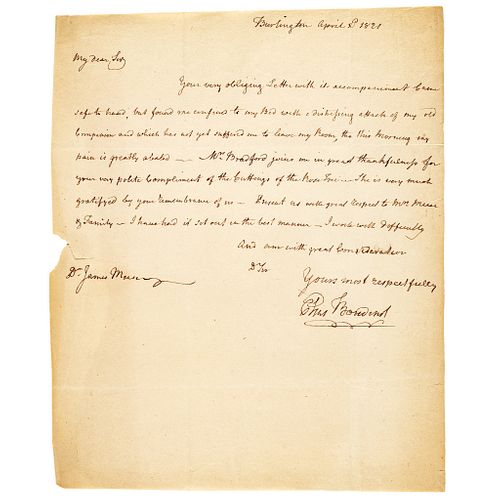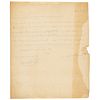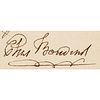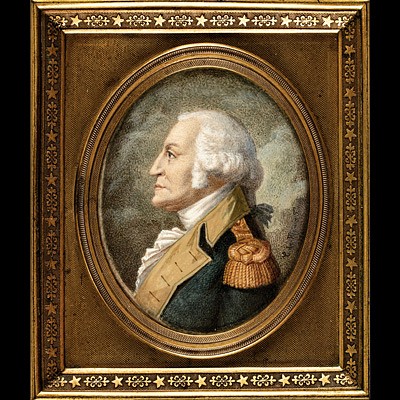ELIAS BOUDINOT Ex-Continental Congress President Writes to a Noted Doctor Friend
Lot 4
Estimate:
$800 - $1,000
Absentee vs Live bid
Two ways to bid:
- Leave a max absentee bid and the platform will bid on your behalf up to your maximum bid during the live auction.
- Bid live during the auction and your bids will be submitted real-time to the auctioneer.
Bid Increments
| Price | Bid Increment |
|---|---|
| $0 | $10 |
| $200 | $20 |
| $300 | $25 |
| $500 | $50 |
| $1,000 | $100 |
| $2,000 | $200 |
| $3,000 | $250 |
| $5,000 | $500 |
| $10,000 | $1,000 |
| $20,000 | $2,000 |
| $30,000 | $2,500 |
| $50,000 | $5,000 |
| $100,000 | $10,000 |
| $200,000 | $20,000 |
| $300,000 | $25,000 |
| $500,000 | $50,000 |
About Auction
By Early American History Auctions
May 22, 2021
Set Reminder
2021-05-22 12:00:00
2021-05-22 12:00:00
America/New_York
Bidsquare
Bidsquare : Autographs-Colonial-Political-Americana
https://www.bidsquare.com/auctions/early-american-history-auctions/autographs-colonial-political-americana-6913
302 Lots of Rare, Historic Autographs, Americana, Civil War Era, George Washington, Abraham Lincoln, Slavery & Black History, Revolutionary War Era, Colonial America, Federal Period, War of 1812, Colonial Currency, Indian Peace Medals & more... Early American History Auctions auctions@earlyamerican.com
302 Lots of Rare, Historic Autographs, Americana, Civil War Era, George Washington, Abraham Lincoln, Slavery & Black History, Revolutionary War Era, Colonial America, Federal Period, War of 1812, Colonial Currency, Indian Peace Medals & more... Early American History Auctions auctions@earlyamerican.com
- Lot Description
Autographs
Elias Boudinot Ex-Continental Congress President, Five Months Prior to his Death Writes to a Noted Doctor Friend
ELIAS BOUDINOT (1740-1821). President of the Continental Congress, Signing the "Treaty of Paris" in that capacity, as 2nd Confederation Congress President (1782-83), Revolutionary War Officer, George Washington's Attorney General and close friend, later Director of the U.S. Mint (1795-1805).
April 2, 1821-Dated (five months prior to his death), Autograph Letter Signed, "Elias Boudinot", 1 page, measuring 10" x 8", Burlington, NJ, Very Fine. Boudinot writes to Dr. James Mease (1771-1846), a prominent American scientist, horticulturist, and physician from Philadelphia who also invented ketchup! It reads, in part:
"Burlington April 2, 1821 -- My Dear Sir -- Your very obliging letter... found me confined to my bed with a distressing attack of my old companion (possibly gout) and which has not yet suffered me to leave my Room, tho' this morning my pain is greatly abated - Mrs. Bradford joins me in great thankfulness for your very polite compliment of the Cuttings of the Rose Tree... Present us with great respect to Mrs. Mease & Family... I write with difficulty... (Signed) Elias Boudinot."
Small loss on the left margin from when the letters wax seal was opened. Boudinot's signature is prominent at the conclusion, crisp and clear with an interesting flourish beneath; the signature measures fully 1.75" across. Autograph Letters Signed by Boudinot are scarce.
ELIAS BOUDINOT (1740-1821). American Revolutionary War era Statesman. Boudinot was a close friend of Washington's, and a tireless supporter of the Revolution and the fledgling Federal government. Despite not signing the Declaration of Independence, the Constitution, or the Articles of Confederation, he is one of the more important political figures from the American Revolutionary Era.
After serving as a Delegate to the Continental Congress, Boudinot became the Secretary of Foreign Affairs. Due to his immense successes in dealing with the aid provided by France, Spain, and Holland, Boudinot was selected to be the 10th President of the Continental Congress in 1782. Boudinot singed the Treaty of Paris while in office as President of the Continental Congress in 1783. After he served as President, Boudinot was elected as a U.S. Representative from New Jersey in 1789. Although he retired after one term, George Washington appointed Boudinot to become Director of United States Mint. Boudinot held the position from 1795-1805.
Boudinot became a prominent lawyer and his practice prospered. As the Revolution drew near, he aligned with the Whigs, and was elected to the New Jersey provincial assembly in 1775. In the early stages of the Revolutionary War, he was active in promoting enlistment; several times he loaned money to field commanders to purchase supplies. Boudinot helped support the activities of rebel spies. After the British occupation of New York City, spies were sent to Staten Island and Long Island, New York to observe and report on movements of specific British garrisons and regiments.
On May 5, 1777, General George Washington asked Boudinot to be appointed as commissary general for prisoners. Congress through the board of war concurred. Boudinot was commissioned as a colonel in the Continental Army for this work. He served until July 1778, when competing responsibilities forced him to resign. The commissary managed enemy prisoners, and also was responsible for supplying American prisoners who were held by the British.
In November 1777, the New Jersey legislature named Boudinot as one of their delegates to the Second Continental Congress. His duties as Commissary prevented his attendance, so in May 1778 he resigned. By early July he had been replaced and attended his first meeting of the Congress on July 7, 1778. As a delegate, he still continued his concerns for the welfare of prisoners of war. His first term ended that year.
In 1781, Boudinot returned to the Congress, for a term lasting through 1783. In November 1782, he was elected as President of the Continental Congress for a one-year term. The President of Congress was a mostly ceremonial position with no real authority, but the office did require him to handle a good deal of correspondence and sign official documents.
On April 15, 1783 he signed the Preliminary Articles of Peace. When the United States (US) government was formed in 1789, Boudinot was elected from New Jersey to the US House of Representatives. He was elected to the second and third congresses as well, where he generally supported the administration. He refused to join the expansion of affiliated groups that formed formal political parties.
In 1794, he declined to serve another term, and left Congress in early 1795. In October 1795, President George Washington appointed him as Director of the United States Mint, a position he held through succeeding administrations until he retired in 1805.
Our Auction Contents:
Black History & Slavery: (Lots 1 - 63)
Abraham Lincoln Related: (Lots 64 - 74)
Historic Autographs: (Lots 75 - 235)
Colonial America: (Lots 236 - 261)
Revolutionary War: (Lots 262 - 304)
George Washington Related: (Lots 305 - 306)
Early American Guns & Weapons: (Lots 307 - 318) - Shipping Info
-
Early American provides in-house worldwide shipping. Please contact us directly if you have questions about your specific shipping requirements.
-
- Buyer's Premium



 EUR
EUR CAD
CAD AUD
AUD GBP
GBP MXN
MXN HKD
HKD CNY
CNY MYR
MYR SEK
SEK SGD
SGD CHF
CHF THB
THB













